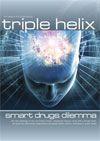Consider this scenario. A memoryboosting drug is available off the internet which could significantly increase your daughter's chance of getting into Oxford University. Her grades are borderline. She tells you that many of her classmates are taking it before exams. She says not having it will jeopardise her chances, not only of getting into Oxford, but even getting into higher education at all. She questions what the moral difference is between buying the drugs, paying for extra tuition, or taking a very strong coffee or ProPlus pills.
Seen by some ambitious students as the winner's edge and maybe their ticket to a top job, so-called 'brain steroids' or 'smart drugs' can be purchased on campuses, or off the internet, for a few pounds. By improving concentration and alertness, students use them to study longer and perform better during exams.
Their use by American students is already widespread, (1) with one student from George Washington University claiming that: '...among my personal friends, I'd say the use is "only" like 50%-60%'. (2)
The journal Nature found large-scale use within academia as a whole, not just among students. Of 1,600 academics from 60 countries, one in five said they had used 'smart drugs' for non-medical reasons, particularly to enhance their focus, concentration or memory. (3)
The UK Government's Foresight Project predicts that: 'pharmacological enhancement of cognition in both the young and old healthy populations seems set to become increasingly popular, extending from dietary supplements and caffeine to drugs specifically targeted at improving cognition.' It cites evidence that healthy volunteers can improve performance with the cognition-enhancing drugs such as methylphenidate and modafinil. (4)
It is not only academics interested in these drugs. The healthy, ageing population is increasingly being considered as potential candidates because deficits in both executive functions and memory are among the most prominent problems with normal ageing. Doctors are also seen as possible users. Research at Imperial College reported last year that: '...fatigued doctors might benefit from pharmacological enhancement in situations that require efficient information processing, flexible thinking, and decision making under time pressure'. It did add that: '...no improvement is likely to be seen in the performance of basic procedural tasks'. (5) Indeed, all of us are candidates. The Foresight Review claims that some people regularly use cognitive enhancers to compete in their work and study environments, to help them overcome the stress and fatigue of a 24/7 society. (6) The most popular drugs at the moment, which are aimed at improving attention, reasoning, planning and even social skills, are Ritalin and Modafinil (Provigil). Although Modafinil is licensed for treatments of narcolepsy in adults, 90% of prescriptions are for off-label use, such as jet lag, tiredness and sleep substitute. (7) The stimulant, Adderall, available in the US, has been used by athletes to enhance their reaction time, energy levels and performance, but has recently led to some NFL players being suspended. (8) Although the sizes of the effects of these drugs (to date) range from small to moderate, even small percentage increments in performance could have a significant impact.
So far, warnings have centered on the addictive properties and side effects of these compounds. Of particular concern is the use of smart drugs among people aged 18–25, the most common non-medical users. The brain continues to mature until the late twenties and beyond. No one really understands the consequences of long-term use of stimulants on the developing brain. At present, there is only scant data about off-label use. The physical risks may however be countered by the potential improvements in both safety and performance of the drugs, and people are often willing to accept a trade-off in risk for immediate benefits. The popularity of cosmetic surgery illustrates this trade-off well.
Cheshire is surely right to warn that: 'The astonishing complexity and delicate fragility of the human nervous system require that pharmacological interventions be undertaken with utmost caution and care'. (9)
It may be that by using new pharmaceutical drugs, some capacities are minimised in order for others to develop. For example, the 'doogie' mouse is a genetically modified mouse with enhanced memory, however this has also enhanced its capacity to experience and remember pain. (10) If pills aim to block painful memories, how would we then learn to deal fully with suffering or sorrow? Will new drugs undermine the opportunity to truly 'flourish' with rich, fulfilled lives? If your daughter takes some 'smart drugs', gaining entrance to Oxford University as a result, has she missed out on essential human experiences – striving for success and learning to live with discipline, perseverance and perhaps failure? Will she feel under pressure to continue taking pills, to maintain her 'achievements'?
Some worry that enhancements will make personal efforts and achievements meaningless because we will not know if achievements are due to our own striving or to technology. (11) Others agree that desiring happiness and success is good, but not without the real disciplines, attachments and achievements that are essential for true human flourishing. (12)
Arguments to legitimise the use of 'smart drugs' often appeal to ideologies of individualism and autonomy: 'To prevent (people) making decisions is to judge that they are unable to make a decision about what is best for their own lives'. (13) However, ironically, once technologies are widely adopted this can generate an expectation, and peer pressure, to conform to a new standard or norm. A student using pills to help study and concentrate may actually feel he/she has no choice but to take them in order to keep up with others. This is not dissimilar to the pressure for athletes to use steroids - not necessarily to gain a decisive edge, but just to remain in the game.
Regulation of these drugs is desirable, but not straightforward. One-third of the drugs used for non-medical purposes are purchased over the internet. Globalisation strongly influences off-label use of them via internet marketing, which is almost impossible to regulate and control. (14)
These are challenging dilemmas, and we need to work out how to achieve the right balance here. Enhanced cognitive abilities do not automatically mean better, happier lives. Christians will have a different perspective on achievement and performance. 'But you, man of God, flee from all this, and pursue righteousness, godliness, faith, love, endurance and gentleness.' (15) God loves us as ourselves in our weakness, not strength. 'God chose the foolish things of the world to shame the wise'. (16) Christians understand that humans are of value not because of what we can do but who we are, made in the image of God.
CS Lewis predicted our present challenges of transformational technologies, warning that technology, which is always said to extend the powers and abilities of the human race, is in fact a means of extending the power of some over others. Thus: 'Each advance leaves him weaker as well as stronger.' (17) A prescient warning that technology may bring benefits but it will come with costs attached. We need God's wisdom to weigh these up.
































